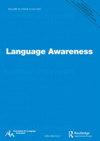Multilingual pragmatic awareness in collaborative writing
IF 2.2
2区 文学
0 LANGUAGE & LINGUISTICS
引用次数: 2
Abstract
Abstract Research on pragmatic awareness of language learners has mainly focused on the target language. As argued by some scholars, a multilingual perspective should also be adopted in the analysis of pragmatic awareness. In fact, existing findings point to the peculiar characteristics of multilingual pragmatic comprehension and awareness. Bearing these aspects in mind, this paper focuses on the pragmatic awareness of multilingual learners while they are performing a collaborative writing task in three different languages, namely those of Catalan, Spanish, and English. The corpus consists of recordings from 30 university students’ oral interactions while working in pairs to write three email request messages. In an attempt to provide a holistic and ecological account of learners’ performance, pragmatic-related episodes were identified by considering Brown and Levinson’s politeness features (1987) and Leech’s (1983) approach to pragmatic competence. Results are in line with previous studies tackling multilingual learners of English and they provide us with interesting insights about the mechanisms that multilingual students activate when planning and performing pragmatic production tasks during collaborative work. ABSTRACT Las investigaciones llevadas a cabo en torno a la conciencia pragmática de los estudiantes de lenguas se han centrado principalmente en la lengua meta. Tal y como exponen algunos académicos, se debería también adoptar una perspectiva multilingüe en el análisis de la conciencia pragmática. De hecho, las pruebas existentes nos señalan las peculiaridades que caracterizan la comprensión y la conciencia pragmática multilingüe. Teniendo en cuenta estos aspectos, este artículo se centra en la conciencia pragmática de estudiantes multilingües al momento de realizar una tarea colaborativa en tres lenguas diferentes, concretamente catalán, castellano e inglés. El corpus analizado consiste en las grabaciones orales de 30 estudiantes universitarios que, en parejas, redactaron conjuntamente tres correos electrónicos donde se formula una petición. Los episodios pragmáticos fueron identificados siguiendo las características de cortesía propuestas por Brown y Levinson (1987) al igual que el enfoque adoptado por Leech (1983) hacia la competencia pragmática en un intento de dotar de una visión más holística y ecológica al estudio. Los resultados coinciden con investigaciones previas que abordan estudiantes multilingües de inglés y nos proveen de un nuevo entendimiento sobre los mecanismos que dichos estudiantes activan al momento de planificar y realizar tareas con un componente pragmático y colaborativo. PLAIN LANGUAGE SUMMARY Multilingual speakers can find similarities and differences between the languages they know. This is of great help when they are learning words or sentences in a new language. But to learn a language means more than just grammar and vocabulary. In everyday life, we make decisions about what, when and how to say things depending on where we are and who we are talking to. This capacity, known as pragmatic competence, comes naturally when socialising and helps us to be polite. Societies have their own rules of politeness and we must pay attention to them when learning languages. For this reason, we studied Spanish-Catalan bilinguals who were learning English at a university level to observe if they were aware of the politeness rules for each of the three languages. In pairs, learners wrote one email in every language asking for favours to their professors. We discovered that these learners were able to collaboratively decide on the best sentences to ask politely and sound formal based on their cultural ideas about the kind of relationship that exists between a student and a professor. We also observed that when having difficulties to sound polite in English, these multilingual learners activated their knowledge of Spanish to successfully find an answer to the problem. We would recommend language experts to create activities that help learners develop their awareness of politeness when speaking or writing, and take advantage of all the languages learners know so they can continue learning new additional ones.合作写作中的多语言语用意识
摘要对语言学习者语用意识的研究主要集中在目的语方面。正如一些学者所说,在分析语用意识时也应该采用多语言的视角。事实上,现有的研究结果指出了多语言语用理解和意识的独特特征。考虑到这些方面,本文重点研究了多语学习者在用加泰罗尼亚语、西班牙语和英语三种不同语言进行合作写作时的语用意识。该语料库由30名大学生在两人一组写三封电子邮件请求时的口头互动记录组成。为了对学习者的表现提供一个全面而生态的描述,通过考虑Brown和Levinson的礼貌特征(1987)以及Leech(1983)的语用能力方法,确定了与语用相关的事件。研究结果与之前针对多语言英语学习者的研究一致,它们为我们提供了关于多语言学生在合作工作中规划和执行语用生产任务时激活的机制的有趣见解。摘要:这项研究是一项关于长期研究的实践协调的研究,也是长期研究的主要内容。在学术界,我们采用了多语言的观点。事实上,在多语言的综合性和实践协调性方面,存在着一些特殊的问题。在这方面,艺术中心致力于多语言研究的实践协调,以实现不同长度的合作。语料库分析包括30名大学研究人员的简历,以及电子版的编辑。Brown和Levinson(1987)的《实践汇编》和Leech(1983)的《实施汇编》确定了实践汇编的特征,以实现对人类健康和生态研究的愿景。这一结果与之前的研究结果一致,即研究人员使用多种语言进行研究,而没有新的研究结果证明研究人员在计划和实现实践和合作组成部分的过程中会采取行动。普通语言摘要说多种语言的人可以发现他们所知道的语言之间的相似之处和不同之处。当他们学习一门新语言的单词或句子时,这是非常有帮助的。但学习一门语言不仅仅意味着语法和词汇。在日常生活中,我们会根据自己在哪里以及与谁交谈来决定说什么、什么时候以及如何说话。这种能力被称为语用能力,在社交时很自然,有助于我们保持礼貌。社会有自己的礼貌规则,我们在学习语言时必须注意这些规则。出于这个原因,我们研究了在大学学习英语的西班牙语-加泰罗尼亚语双语者,观察他们是否意识到这三种语言的礼貌规则。两人一组,学习者用每种语言写一封电子邮件,请求帮助他们的教授。我们发现,这些学习者能够根据他们对学生和教授之间存在的关系的文化观念,共同决定礼貌提问和听起来正式的最佳句子。我们还观察到,当这些多语言学习者在英语中听起来很有礼貌时,他们会激活西班牙语知识,成功地找到问题的答案。我们建议语言专家开展活动,帮助学习者在说话或写作时培养礼貌意识,并利用学习者所知道的所有语言,以便继续学习新的额外语言。
本文章由计算机程序翻译,如有差异,请以英文原文为准。
求助全文
约1分钟内获得全文
求助全文
来源期刊

Language Awareness
Multiple-
CiteScore
3.70
自引率
10.00%
发文量
18
期刊介绍:
Language Awareness encourages and disseminates work which explores the following: the role of explicit knowledge about language in the process of language learning; the role that such explicit knowledge about language plays in language teaching and how such knowledge can best be mediated by teachers; the role of explicit knowledge about language in language use: e.g. sensitivity to bias in language, manipulative aspects of language, literary use of language. It is also a goal of Language Awareness to encourage the establishment of bridges between the language sciences and other disciplines within or outside educational contexts.
 求助内容:
求助内容: 应助结果提醒方式:
应助结果提醒方式:


